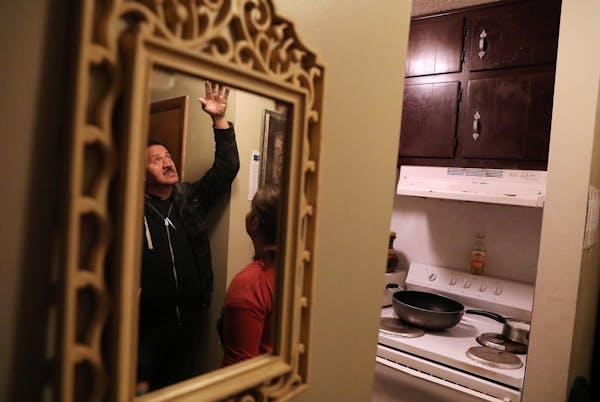A rare class-action lawsuit against two Minneapolis landlords could cost them millions of dollars and benefit thousands of low-income tenants if they prevail.
Hennepin County District Judge Mary Vasaly certified the class-action status Friday in the case against Spiros Zorbalas, Stephen Frenz and the companies they own, including Apartment Shop and Equity Residential Holdings.
"It could be the largest case in terms of damages and rent refunds in U.S. history," said Larry McDonough, a housing attorney with Dorsey & Whitney who crafted the state law that created the housing courts in Hennepin and Ramsey counties but who is not involved in the case. "I could not find a single class action around the country that had this kind of price tag on it."
The lawsuit, brought on behalf of the tenants, accuses Zorbalas and Frenz of hatching a scheme to hide their joint ownership of properties from the city, in breach of city ordinances, and of creating a financial arrangement to benefit Frenz, if he could hold down the costs of repairs.
Frenz is one of the city's largest landlords. Tenants have accused him of failing to fix properties that were in disrepair and burdened by pest and rodent infestations.
McDonough, who called the case against Zorbalas and Frenz "historic," can recall only one other local class-action housing case. He filed that one in the late 1980s, and it resulted in a payout of a few thousand dollars.
More than 1,000 units in about 60 buildings are covered by the new lawsuit, said Michael Cockson of Faegre Baker Daniels, the lead attorney for the tenants.
"We are seeking the return of the total amount of rent paid by the tenants, which could be in the tens of millions of dollars, but the final figure has not yet been confirmed," Cockson said.
Bradley Kletscher, an attorney for Frenz, and Malcolm Terry, an attorney for Zorbalas, did not respond to requests for comment Monday.
Troubled properties
The Minneapolis City Council revoked Zorbalas' rental licenses in 2011 for repeated housing code violations and in 2012, Frenz bought all of his properties. According to the city, Frenz failed to disclose that Zorbalas continued to be an owner.
Within the year, Frenz was being accused of operating the same substandard buildings that Zorbalas had operated. And in 2016, Frenz was sued by tenants for a pest and rodent infestation and lack of repairs at one apartment building. During the trial, Cockson and his team of pro bono attorneys discovered that Zorbalas still had a financial interest in Frenz's buildings. The city investigated, concurred and began a revocation action against Frenz.
A September hearing is scheduled on a proposal by the city's regulatory division to strip Frenz of his rental licenses. If an administrative judge approves, the City Council must vote on it.
On Friday, Vasaly issued a 35-page court order certifying the class-action suit.
"All of the plaintiffs experienced repeated problems with their units, including broken windows, electrical outlets and inoperative stoves," she wrote. "Most also had problems with roach, bedbug and rodent infestation that required repeated treatment."
The judge's ruling also spells out previously undisclosed allegations about the financial arrangements between Zorbalas and Frenz intended to conceal their shared ownership of the properties. To that end, Vasaly wrote, the two men established additional companies that made it appear that Frenz owned them and that Zorbalas no longer had an interest.
At Equity Residential, she wrote, Zorbalas, the chief executive officer, exercised control over Frenz, the chief operating officer. After March 2015, Frenz was entitled to a monthly cash distribution "but only if Equity Residential hit its 'Net Operating Income Target' for the preceding year," Vasaly wrote.
"According to plaintiffs, this provision incentivized Frenz to limit, as much as possible, maintenance expenses needed to comply with lead, asbestos, pest control, and other statutes and regulations," the judge wrote.
Wider repercussions?
In Minneapolis, where renters make up more than half the population, a class-action case could have repercussions, according to attorneys with expertise in housing law.
While most landlords take care of their properties, the lawsuit sends a signal that saving money by putting off maintenance might not be worth the risk, McDonough said.
Prof. Ann Juergens of the Mitchell Hamline School of Law and a longtime housing attorney, said the lawsuit has the potential "of drying up the sources of capital" for landlords who don't comply with housing regulations because lenders may be less inclined to invest in them.
It is still unclear what will happen to Frenz's buildings and his tenants, should Frenz lose his licenses.
'Human error' behind Robbinsdale shelter-in-place alert that was mistakenly sent countywide

Going to Wolves or Twins tonight? How to get there (and maybe avoid traffic).
Focusing on bringing football film into frame

